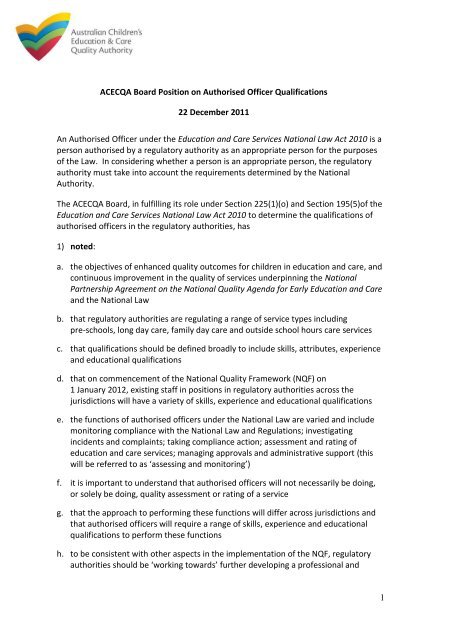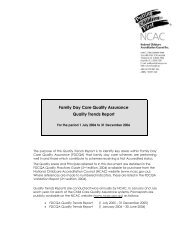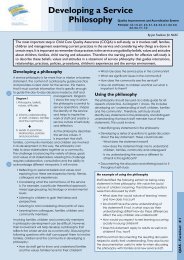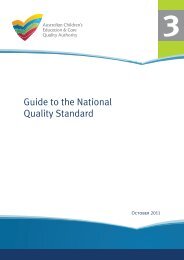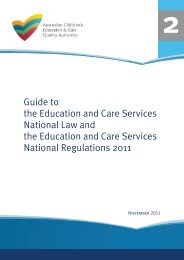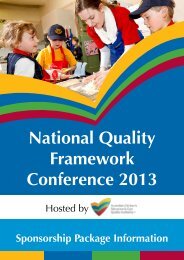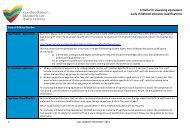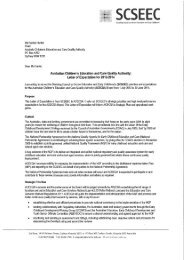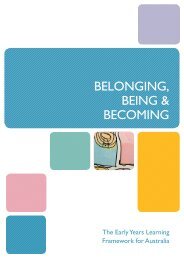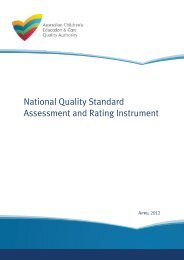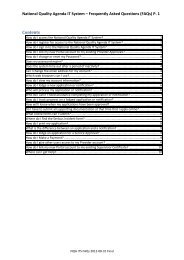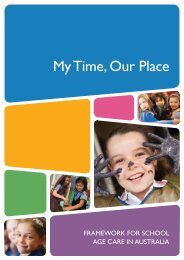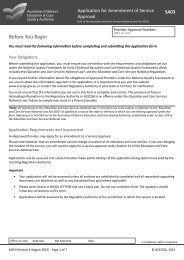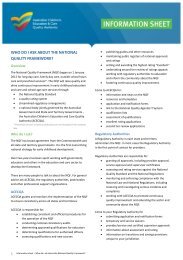NQF qualification requirements for Authorised Officers PDF - acecqa
NQF qualification requirements for Authorised Officers PDF - acecqa
NQF qualification requirements for Authorised Officers PDF - acecqa
You also want an ePaper? Increase the reach of your titles
YUMPU automatically turns print PDFs into web optimized ePapers that Google loves.
ACECQA Board Position on <strong>Authorised</strong> Officer Qualifications<br />
22 December 2011<br />
An <strong>Authorised</strong> Officer under the Education and Care Services National Law Act 2010 is a<br />
person authorised by a regulatory authority as an appropriate person <strong>for</strong> the purposes<br />
of the Law. In considering whether a person is an appropriate person, the regulatory<br />
authority must take into account the <strong>requirements</strong> determined by the National<br />
Authority.<br />
The ACECQA Board, in fulfilling its role under Section 225(1)(o) and Section 195(5)of the<br />
Education and Care Services National Law Act 2010 to determine the <strong>qualification</strong>s of<br />
authorised officers in the regulatory authorities, has<br />
1) noted:<br />
a. the objectives of enhanced quality outcomes <strong>for</strong> children in education and care, and<br />
continuous improvement in the quality of services underpinning the National<br />
Partnership Agreement on the National Quality Agenda <strong>for</strong> Early Education and Care<br />
and the National Law<br />
b. that regulatory authorities are regulating a range of service types including<br />
pre-schools, long day care, family day care and outside school hours care services<br />
c. that <strong>qualification</strong>s should be defined broadly to include skills, attributes, experience<br />
and educational <strong>qualification</strong>s<br />
d. that on commencement of the National Quality Framework (<strong>NQF</strong>) on<br />
1 January 2012, existing staff in positions in regulatory authorities across the<br />
jurisdictions will have a variety of skills, experience and educational <strong>qualification</strong>s<br />
e. the functions of authorised officers under the National Law are varied and include<br />
monitoring compliance with the National Law and Regulations; investigating<br />
incidents and complaints; taking compliance action; assessment and rating of<br />
education and care services; managing approvals and administrative support (this<br />
will be referred to as ‘assessing and monitoring’)<br />
f. it is important to understand that authorised officers will not necessarily be doing,<br />
or solely be doing, quality assessment or rating of a service<br />
g. that the approach to per<strong>for</strong>ming these functions will differ across jurisdictions and<br />
that authorised officers will require a range of skills, experience and educational<br />
<strong>qualification</strong>s to per<strong>for</strong>m these functions<br />
h. to be consistent with other aspects in the implementation of the <strong>NQF</strong>, regulatory<br />
authorities should be ‘working towards’ further developing a professional and<br />
1
skilled work<strong>for</strong>ce <strong>for</strong> the delivery of all of their functions under the <strong>NQF</strong>, which may<br />
include working towards <strong>qualification</strong> <strong>requirements</strong><br />
i. the importance of national consistency in training <strong>for</strong> authorised officers, the need<br />
to develop a sustainable and ongoing strategy <strong>for</strong> training of authorised officers, and<br />
the desirability of authorised officer training being an accredited course leading to<br />
an educational <strong>qualification</strong><br />
j. that when an authorised officer is per<strong>for</strong>ming assessment and rating functions, a<br />
particular educational <strong>qualification</strong> in itself is not sufficient to ensure that an<br />
authorised officer is able to accurately observe current practice and assess it against<br />
the National Quality Standard (NQS)<br />
k. the definition of ECEC <strong>qualification</strong>s from the 2010 National Early Childhood<br />
Education and Care Work<strong>for</strong>ce Census, which in part aims to assist the<br />
Commonwealth and State and Territory governments to implement the <strong>NQF</strong>,<br />
includes early childhood teaching, primary teaching, other teaching, childcare,<br />
nursing, other human welfare studies, behavioural science and other early<br />
childhood education and care related <strong>qualification</strong>s<br />
l. that like the <strong>qualification</strong>s <strong>for</strong> the broader work<strong>for</strong>ce under the <strong>NQF</strong>, <strong>qualification</strong>s<br />
<strong>for</strong> authorised officers should be implemented over time<br />
m. the <strong>qualification</strong>s <strong>for</strong> authorised officers should be reviewed in 2014 by the ACECQA<br />
Board<br />
2) determined that:<br />
a. the definition of ECEC <strong>qualification</strong>s in the 2010 National ECEC Work<strong>for</strong>ce Census<br />
would be adopted (see 1(k) above)<br />
b. the key <strong>requirements</strong> <strong>for</strong> authorised officers are they:<br />
are appropriately trained <strong>for</strong> the functions they are undertaking in assessing and<br />
monitoring<br />
are appropriately trained in the <strong>NQF</strong>, including the National Law, Regulations<br />
and the NQS<br />
have <strong>qualification</strong>s and experience consistent with the functions they are<br />
undertaking in assessing and monitoring<br />
o <strong>qualification</strong>s could be in a variety of fields at different levels<br />
o length and type of experience is not defined but experience in the types<br />
of services they are assessing and monitoring may be relevant<br />
are appropriately trained in record keeping, investigation, decision making and<br />
report writing<br />
have knowledge, expertise, professional values, integrity and the ability to<br />
develop respectful working relationships, which will give them credibility with<br />
2
the services they are assessing and monitoring, the families of the children in<br />
those services, and the broader sector.<br />
are reliable and consistent in their assessments and en<strong>for</strong>cement approach<br />
are able to operate as part of a team based approach to assessment<br />
have opportunities <strong>for</strong> ongoing professional development<br />
if they are undertaking assessments and ratings of services, have skills,<br />
experience and <strong>qualification</strong>s to enable in<strong>for</strong>med assessment of the pedagogical<br />
aspects of the NQS<br />
c. the minimum <strong>qualification</strong> <strong>requirements</strong> <strong>for</strong> authorised officers from 1 January 2012<br />
are skills, experience and <strong>qualification</strong>s consistent with the functions they are<br />
undertaking in assessing and monitoring<br />
d. once the authorised officer training program has been implemented by jurisdictions<br />
and no later than 1 July 2012, the minimum <strong>qualification</strong> <strong>requirements</strong> <strong>for</strong><br />
authorised officers are:<br />
assessment and rating training <strong>for</strong> those authorised officers undertaking that<br />
function<br />
training in the <strong>NQF</strong>, including the National Law and Regulations and NQS<br />
skills, experience and <strong>qualification</strong>s consistent with the functions they are<br />
undertaking in assessing and monitoring<br />
e. given that about 70 per cent of the services covered by the <strong>NQF</strong> are in the Early<br />
Childhood Education and Care sector, from 1 January 2014, each jurisdiction will aim<br />
to have more than 50 per cent of its authorised officers holding early childhood<br />
education and care <strong>qualification</strong>s, whether at diploma, degree or higher degree<br />
level<br />
f. <strong>qualification</strong>s <strong>for</strong> authorised officers will be reviewed in 2014 by the ACECQA Board.<br />
This review will include consultation and be in<strong>for</strong>med by the outcomes of other<br />
reviews including the 2013 Work<strong>for</strong>ce Review and the 2014 COAG Review of the<br />
National Partnership Agreement on Early Childhood Education and Care. The<br />
ACECQA Board will then establish <strong>qualification</strong> targets <strong>for</strong> 1 January 2020.<br />
g. ACECQA will monitor the consistency across the jurisdictions of the achievement of<br />
the goals and report to the Ministerial Council in 2014, 2016 and 2018 on the<br />
increasing <strong>qualification</strong>s of the authorised officers.<br />
3


